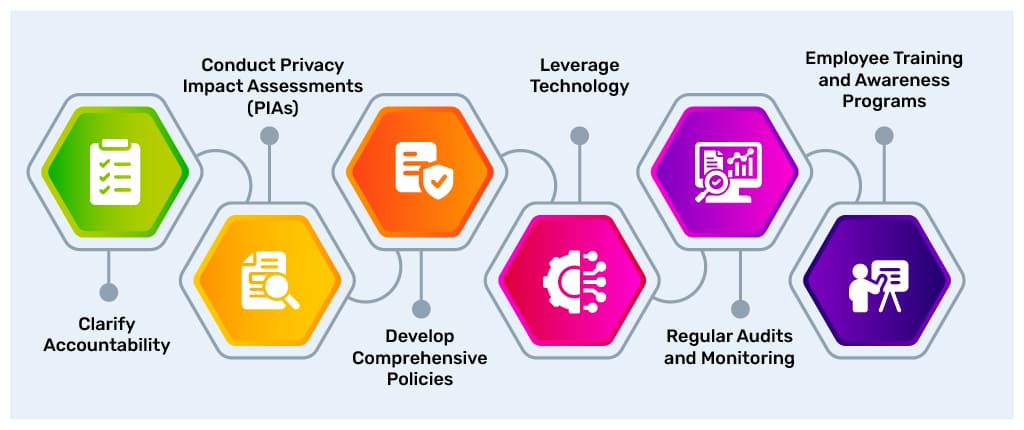
With the growing emphasis on data privacy worldwide, Saudi Arabia has implemented the Personal Data Protection Law (PDPL) to regulate personal data collection, processing, and storage. Despite its importance, many businesses remain uncertain about compliance, leading to fears and doubts. This blog explores these challenges and provides practical strategies for organizations to address them effectively.
The KSA PDPL, revised on September 14, 2023, is enforced by the Saudi Data & Artificial Intelligence Authority (SDAIA). Its primary aim is to protect individual privacy, regulate data processing, and implement data subjects’ rights, such as accessing and correcting personal data.
The PDPL applies to:
This extraterritorial scope means global businesses interacting with Saudi citizens must also comply.

Many businesses are unsure about the specific requirements of the PDPL. For instance:
The PDPL has extraterritorial application, meaning it applies not only within Saudi Arabia but also to organizations outside the Kingdom that process data related to KSA residents. Businesses operating internationally often find it difficult to interpret how this applies to them. This ambiguity delays compliance efforts, as companies hesitate to implement measures without clear guidance.
Non-compliance with the PDPL can result in fines of up to 5 million SAR (~USD 1.3 million), posing significant financial and reputational risks. Small and medium-sized businesses, in particular, worry about their ability to afford these penalties, while the potential damage to trust among customers and stakeholders adds to their concerns. This fear of steep penalties often paralyses organizations, delaying the implementation of necessary measures. In some cases, companies rush their compliance efforts, increasing the likelihood of oversights that leave them vulnerable to violations.
Building a compliant data privacy framework is a complex, multi-step process. It requires setting up governance structures, drafting policies, creating workflows for data subject requests, and monitoring for breaches while updating controls. Many businesses lack the internal expertise to develop such comprehensive privacy programs. Smaller organizations often face additional hurdles due to limited resources for hiring consultants or adopting advanced tools. This complexity makes it challenging for businesses to meet deadlines, leaving them exposed to potential legal actions.
Employees often lack awareness of privacy laws and their roles in maintaining compliance. For instance, staff may unknowingly share sensitive company data on social media or handle personal data without proper controls. While companies focus on implementing tools and policies, they often neglect employee training programs, which leaves the workforce ill-prepared. Even with robust policies in place, human error remains a significant vulnerability, increasing the risk of breaches.
Many businesses lack adequate technology to manage and track personal data effectively. For example, they may not have tools to map data flows, consent management systems, or real-time breach monitoring. These gaps often result in slow, error-prone manual processes. Additionally, technology solutions can require substantial investment, which is usually a barrier for small businesses. As a result, these gaps leave organizations vulnerable to undetected violations, increasing the risk of fines and data breaches.

This section provides actionable strategies for businesses to address uncertainties about compliance with the KSA PDPL. Here’s a breakdown of each step mentioned:
Assigning a Data Privacy Officer (DPO) is crucial in ensuring compliance. The DPO provides leadership and accountability for privacy-related initiatives, keeping top-level management informed about privacy risks and strategies. This role reduces ambiguity by establishing a clear point of contact for all privacy matters, ensuring privacy becomes a strategic priority rather than an afterthought.
Privacy Impact Assessments are systematic evaluations that help identify and mitigate risks associated with data processing activities. By uncovering vulnerabilities, these assessments demonstrate compliance readiness to regulatory authorities. They also document risk-reduction efforts, providing an audit trail while prioritizing high-risk areas so businesses can allocate resources effectively.
Establishing formal guidelines and processes for privacy activities, such as managing data subject rights, consent, and breach notifications, is essential. These policies ensure consistency in privacy practices across the organization and cover legal obligations under the PDPL. By maintaining compliance policies, businesses reduce legal exposure while building customer trust through transparent data-handling practices.
Utilizing specialized tools, often referred to as PrivacyOps tools, helps automate tasks like data mapping, consent tracking, and impact assessments. These tools enhance efficiency, reduce errors associated with manual processes, and improve visibility into the lifecycle of personal data. Additionally, they enable businesses to respond quickly to compliance requirements, such as data subject requests.
Periodic reviews and audits of privacy programs are vital for ensuring alignment with evolving regulations and organizational goals. Early detection of compliance gaps allows for timely remediation while tracking the performance of privacy measures promotes a culture of continuous improvement. These audits prepare businesses for regulatory inspections and ensure ongoing compliance.
Training employees on privacy laws and their responsibilities reduces the likelihood of human error, a common cause of data breaches. Providing ongoing resources helps instill a privacy-first mindset across the organization. An informed workforce is better equipped to handle personal data responsibly and mitigate privacy risks effectively.
Implementing these steps addresses the core challenges organizations face—lack of clarity, fear of penalties, and gaps in technology and processes. It creates a structured and proactive approach to compliance, making it easier for businesses to align with the PDPL while building customer trust.
Ahlan Cyber provides end-to-end privacy compliance solutions tailored to KSA PDPL requirements.
Key Services:
Our cybersecurity professionals are dedicated to offering you prompt and personalized support. Whether you have any questions, need some assistance, or want quick support, feel free to reach out. We'll respond as soon as possible.
3141, Anas Bin Malik Street, 8292 Al Malqa, Riyadh, Kingdom of Saudi Arabia.
+96 6569 016 866Copyright © 2025 Ahlan Cyber. All Rights Reserved.